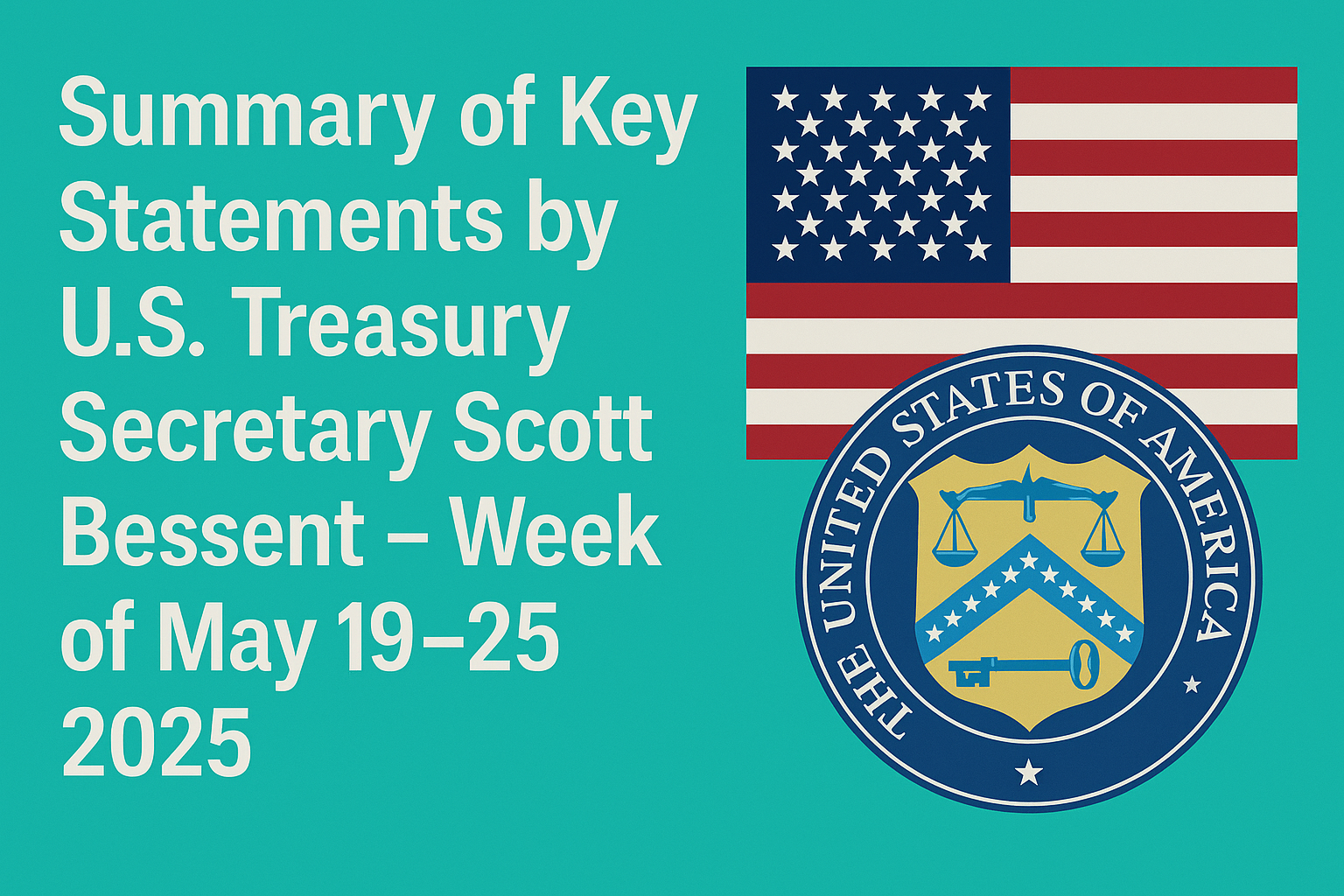This report provides a comprehensive summary of the most significant public statements and policy actions by U.S. Treasury Secretary Scott Bessent during the week of May 19–25, 2025. From escalating trade tensions with the European Union to promising progress in U.S.–China negotiations, and from domestic tax reform to internal disputes within the administration, Bessent’s comments offer critical insights into the economic and geopolitical priorities of the current U.S. administration. Each section includes verified sources to ensure accuracy and traceability.
EU Tariff Threat and Negotiation Strategy
Secretary Bessent supported President Trump’s proposed 50% tariffs on European Union (EU) imports, initially set to take effect on June 1. He expressed hope that this threat would “light a fire under the EU” to expedite trade negotiations, criticizing the EU’s collective negotiation approach as inefficient. Following a conversation between President Trump and European Commission President Ursula von der Leyen, the tariff implementation was postponed to July 9 to allow more time for discussions.
Progress in U.S.–China Trade Talks
In mid-May, Secretary Bessent led U.S. negotiations with Chinese Vice Premier He Lifeng in Geneva. Both parties reported “substantial progress” and agreed to establish a new consultation mechanism to address ongoing trade and economic issues. While specific details were not disclosed, the talks were described as constructive, aiming to ease tensions and reduce high tariffs between the two nations. (The Washington Post, Reuters)
Tax Reform and Fiscal Policy
Bessent advocated for the “One Big Beautiful Bill Act,” a comprehensive tax reform package aiming to extend the 2017 tax cuts and reduce the federal corporate tax rate from 21% to 15% for U.S. manufacturers. He emphasized that this reform is crucial for maintaining U.S. economic competitiveness. However, analysts warn that the bill could significantly increase the federal deficit, potentially reaching 120% of GDP by 2034. (Wipfli, Investor’s Business Daily)
Financial Regulation: Supplementary Leverage Ratio (SLR)
Bessent indicated that U.S. regulators might ease the Supplementary Leverage Ratio (SLR) rule this summer. The SLR currently limits banks’ ability to hold U.S. Treasuries, and its relaxation could enhance market liquidity and reduce long-term interest rates. He noted that the Federal Reserve, FDIC, and OCC are collaboratively working on this adjustment. ( Reuters)
U.S.–Japan Economic Relations
During the G7 Finance Ministers meeting in Banff, Canada, Bessent met with Japanese Finance Minister Katsunobu Kato. They discussed bilateral trade and reaffirmed that exchange rates should be market-determined, acknowledging that the current dollar-yen rate reflects economic fundamentals. No specific foreign exchange levels were addressed. (Compliance Alliance, U.S. Department of the Treasury)
Conflict with Elon Musk
Reports emerged of a heated altercation between Secretary Bessent and entrepreneur Elon Musk within the White House. The dispute, reportedly over the appointment of the next IRS leader, involved profanities and was loud enough for President Trump to hear. This incident highlights internal tensions within the administration regarding leadership and policy direction. (Axios, The Atlantic, The Times of India)
Sources:
- Reuters: Bessent says Trump tariff threat may light a fire under EU in trade talks
- The Washington Post: Trump says he will delay tariffs on European Union until July 9
- The White House: Joint Statement on U.S.-China Economic and Trade Meeting in Geneva
- NPR: Here’s what’s in the GOP megabill that’s just passed the House
- Bloomberg: Bessent Sees Easing Capital Rule on Treasuries This Summer
- U.S. Department of the Treasury: Readout from Secretary of the Treasury Scott Bessent’s Meeting with Finance Minister Katsunobu Kato of Japan
- The Independent: Bessent shouted profanities at a goading Elon Musk in West Wing


